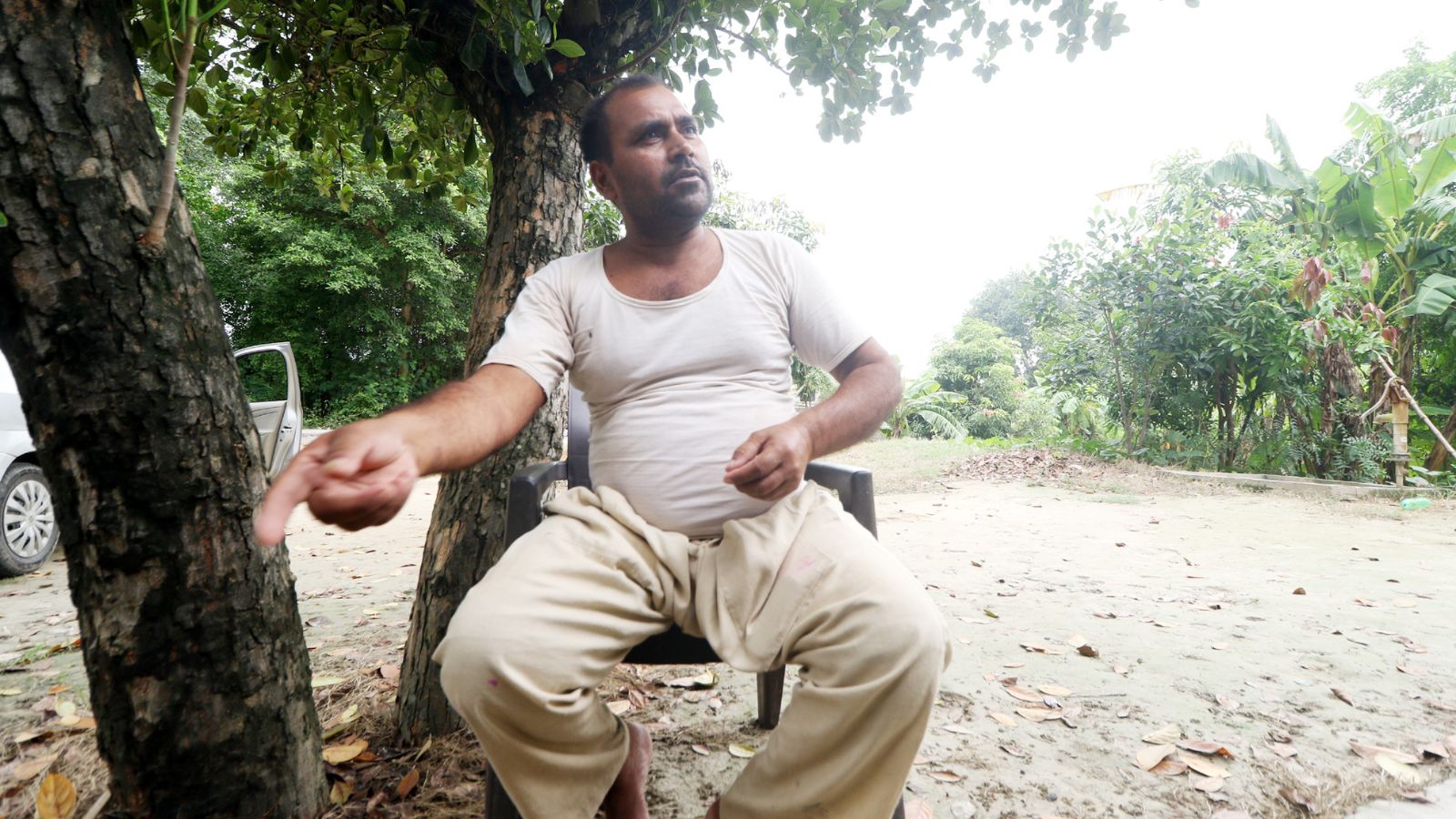Dabbu, Rudra and a mango: How a children’s scuffle turned into murder case that dragged on for 40 years
While advocate Namit Saxena represented the State of Uttar Pradesh in the Supreme Court, advocates Jagjit Chhabra and Saksham Maheshwari appeared for the accused.
 Rudra Pratap Singh standing on on the same mango tree, at the incident spot. He was 10 years old at the time.(Express Photo by Vishal Srivastav)
Rudra Pratap Singh standing on on the same mango tree, at the incident spot. He was 10 years old at the time.(Express Photo by Vishal Srivastav)Dabbu had spotted the mango, Rudra said it was his. On a hot April day back in 1984, two friends fought over the fallen mango near a field in Lorhiya Ghata village in Uttar Pradesh’s Gonda district. The fruit would go on to extract a steep price, resulting in a murder case that would drag on for 40 years and traverse the length of the Indian judiciary, from the lowest court all the way up to the Supreme Court.
On July 24, the Supreme Court converted the conviction of murder in the case to the less stringent culpable homicide. But by the time the ruling came, two of the accused — Rudra Pratap Singh’s father Ayodhya Singh and uncle Lalji Singh — had already been dead for some years and the relationship between the two friends had changed irrevocably.
 “Because of the incident, my family was socially boycotted. We were not invited to any functions, and no one visited our house for 15 years. Those years were very hard for my family,” Rudra, dressed in a blue T-shirt and shorts, says. (Express photo by Vishal Srivastav)
“Because of the incident, my family was socially boycotted. We were not invited to any functions, and no one visited our house for 15 years. Those years were very hard for my family,” Rudra, dressed in a blue T-shirt and shorts, says. (Express photo by Vishal Srivastav)
According to court documents, it started when Vishwanath’s 10-year-old son Brijesh Singh alias Dabbu spotted the mango while playing with his friend and neighbour Rudra, then 9, on April 19, 1984. Dabbu claimed proprietary rights over the fruit since it was found in his father’s field, reducing his friend to tears.
Rudra’s complaints brought his father Ayodhya and four others — Man Bahadur Singh, Lalji Singh, Bharat Singh, and Bhanu Pratap Singh — to the field, all armed with lathis. Their loud admonition of his son Dabbu drew the attention of Vishwanath, who was threshing wheat nearby, and he soon joined them.
It was then that the situation took a turn for worse, court documents show. “The aforesaid accused thereupon started beating Vishwanath Singh with lathis,” a court document says.
As Vishwanath approached the group, the adults gathered there began to assault him. Vishwanath tried to strike back with his khodni — a spade-like gardening tool — but it didn’t stop the assault, the documents show.
By this time, Vishwanath’s two brothers — Jagannath Singh and Jagdish Singh — had reached the site of commotion but they too were allegedly beaten up. It stopped when four other people joined in and the accused left the scene, the court documents show.
 Dabbu Singh with his son Nirbhay Singh at his new house at Lodhiaghata village in Gonda District. (Express Photo by Vishal Srivastav)
Dabbu Singh with his son Nirbhay Singh at his new house at Lodhiaghata village in Gonda District. (Express Photo by Vishal Srivastav)
Vishwanath died on the way to hospital, and an FIR in the case was registered at UP’s Kotwali (Dehat) Police Station under Gonda district on the basis of a complaint by Vishwanath’s brother Jagannath Singh, who would eventually become Prosecution Witness-1 (PW-1) for the trial ahead.
A post-mortem revealed that Vishwanath had multiple bone-deep lacerations and abrasions on his head, a hematoma (blood clot caused by broken blood vessels), and a broken occipital bone.
On April 4, 1986, a trial court in Gonda district held all five of the suspects guilty of IPC sections related to murder, rioting and unlawful assembly, among others, and sentenced them to life imprisonment.
While reading out its ruling, the court said that although the accused claimed that Vishwanath and his brother Jagdish Singh had been assaulting Rudra and they only came to his defence, it found no evidence to support this.
“The defence version is a sheer belated concoction and is unacceptable,” Additional Sessions Judge M.P. Singh said in his order. “The deceased Vishwanath Singh was aged only 28 years according to the postmortem report. His son Brijesh alias Dabbu lost his father for a small mango fruit. Feudal fanation (sic) could go to such an extent as to cause (the) death of a young man. Simply because a small mango fruit was snatched away by his son from the accused’s son.”
Although the accused filed an appeal in the Allahabad High Court that same year, the case progressed at a glacial pace. All five were released on bail soon after the appeal was filed.
According to the Allahabad HC website, it was only in August 2017 — over 30 years after they first appealed the trial court order — that the case was listed. By the time it came to be heard, Dabbu’s father Ayodhya Singh and his uncle Lalji Singh had died.
In December 2022, the High Court upheld the lower court’s conviction of Man Bahadur Singh, Bharat Singh, and Bhanu Pratap Singh —the three accused who were still living. In its ruling, the court rejected the argument that the three had been “falsely roped in this case” and that Vishwanath Singh’s injuries showed they did not intend to kill him.
 His son Brijesh alias Dabbu lost his father for a small mango fruit. (Express photo by Vishal Srivastav)
His son Brijesh alias Dabbu lost his father for a small mango fruit. (Express photo by Vishal Srivastav)
But the SC was more amenable to the accused’s argument. While reducing their charge to culpable homicide and commuting their sentence to seven years on July 24, a Division Bench of Justices Sudhanshu Dhulia and Ahsanuddin Amanullah held that it was “not a case of pre-planned murder” and that the use of a lathi indicated that there was no intention to kill Vishwanath.
While advocate Namit Saxena represented the State of Uttar Pradesh in the Supreme Court, advocates Jagjit Chhabra and Saksham Maheshwari appeared for the accused.
Back at Lorhiya Ghata village, the misshapen mango tree still stands on a patch of land near Vishwananth’s fields, its wide branches casting shadows over the once-firm friendship. Dabbu and Rudra are both over 50, with children and grandchildren of their own. While they continued to live next to each other for a few years afterwards, their relationship was never the same. They stopped going to each other’s houses and attending family events. Eventually, they moved to houses 800 metres apart.
Sitting outside his newly painted house and dressed in a white vest and a loose pyjama, Dabbu, a farmer like his father, talks about how that day changed their lives. “After my father was killed, they kept pressuring us for a compromise but I refused. Rudra and his family would make snide comments whenever they saw me. They were always trying to goad me into a fight,” he says, wringing his hands.
Rudra, however, refutes the allegation of trying to pressure Dabbu, instead claiming that his father Ayodhya Singh reacted in response to Vishwanath Singh’s “provocations”. He also claims that Dabbu’s sons talk to his children and that he, too, is open to mending ties with his old friend but has met with nothing but hostility.
“Because of the incident, my family was socially boycotted. We were not invited to any functions, and no one visited our house for 15 years. Those years were very hard for my family,” Rudra, dressed in a blue T-shirt and shorts, says.
But both appear to agree on one thing — that their fathers’ involvement in a children’s fight caused their relationship to break down. “Sometimes, I think the progress of our family has been hindered because of just one mango,” Rudra now sighs regretfully, balancing himself uneasily on the twisted trunk of the mango tree.
Photos





- 01
- 02
- 03
- 04
- 05

























